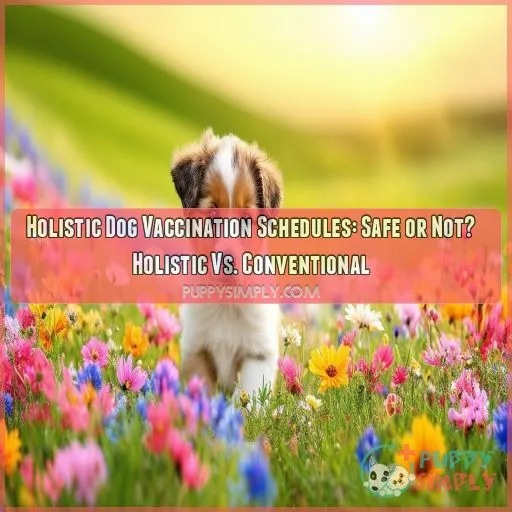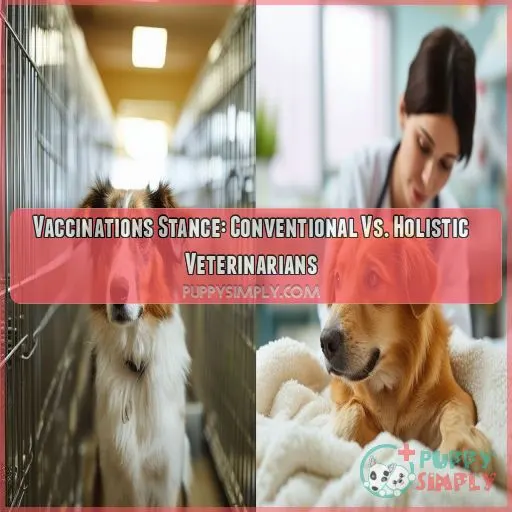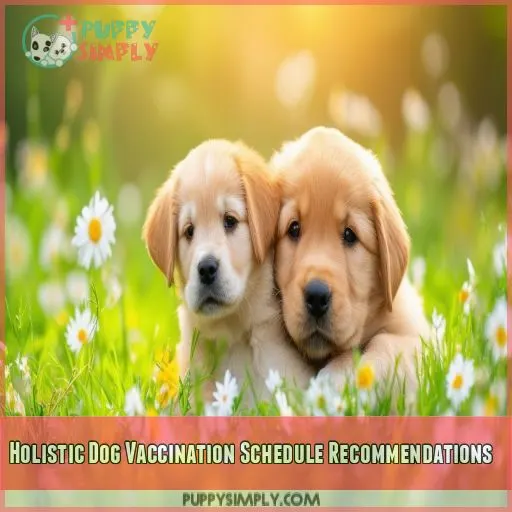This site is supported by our readers. We may earn a commission, at no cost to you, if you purchase through links.

You want to do what’s best for your furry friend, but it’s hard to know who to trust.
Holistic vets and conventional vets often have different takes on dog vaccination schedules, leaving you wondering what’s safe and effective.
This article will explore the pros and cons of holistic dog vaccination schedules, helping you make informed choices for your four-legged family member.
Let’s break down the controversy surrounding this hot topic.
Table Of Contents
- Key Takeaways
- Are Dog Vaccinations Safe?
- Which Dog Vaccinations Are Most Common?
- Vaccinations Stance: Conventional Vs. Holistic Veterinarians
- Holistic Dog Vaccination Schedule Recommendations
- Core Vaccines: What You Need to Know
- The Dangers of Over-Vaccination
- A Better Way: Homeoprophylaxis
- Frequently Asked Questions (FAQs)
- Do holistic vets believe in vaccines?
- What is the proper vaccination schedule for a dog?
- Is there an alternative to rabies vaccine for dogs?
- What dog vaccines are not necessary?
- What side effects can dog vaccinations cause?
- How do I find a holistic vet?
- Are dog vaccinations legally required?
- How often should dogs get vaccinated?
- Can I refuse to vaccinate my dog?
- Conclusion
Key Takeaways
- Vaccinations come with risks, but they’re generally safe and effective at protecting your pup from serious diseases. It’s a tricky decision, but an informed one.
- Holistic vets recommend single vaccines, no annual boosters, and a focus on building health through diet and lifestyle. They believe in a natural approach to wellness.
- Core vaccines provide long-lasting immunity, so no need for frequent boosters. Over-vaccination can lead to chronic issues, so titer tests are a must.
- Homeopathic remedies and nosodes offer an alternative approach to protecting your dog’s health, but it’s a controversial topic. Consult a holistic vet for personalized advice.
Are Dog Vaccinations Safe?
Are dog vaccinations safe? It’s a valid question. After all, any foreign substance carries the risk of an allergic reaction in dogs, and that includes vaccines. So, let’s explore the potential risks and rewards of vaccinating your furry friend.
Risks and Allergic Reactions
Any foreign substance you put in your dog’s body carries a risk of an allergic reaction.
That’s just the nature of the beast. Most dogs respond well to vaccinations, but there are always exceptions to the rule.
Holistic veterinarians believe that vaccinations can have long-term effects on a dog’s health, and they’re not wrong.
The potential dangers of over-vaccination are real, and it’s important to be aware of them.
Mild and Short-term Reactions
While most dogs sail through vaccinations with no issues, some may experience mild and short-lived reactions. These reactions are typically nothing to worry about and usually resolve within a day or two. Here’s what you might see:
- Fever: Your pup might feel a bit warm to the touch, but this should pass quickly.
- Sluggishness: A day or two of extra napping might be needed.
- Reduced appetite: They may not be as keen for treats or dinner, but this too shall pass.
- Temporary pain and swelling at the injection site: A little discomfort is normal and should subside soon.
Rare but Serious Reactions
Although rare, some dogs may experience more severe reactions to vaccines. These can include:
| Reaction | Description |
|---|---|
| Repeated Vomiting or Diarrhea | A sign of digestive distress. |
| Whole Body Itching | Indicative of a potential allergic response. |
| Difficulty Breathing | A cause for concern, requiring immediate attention. |
| Collapse | A serious symptom that needs urgent veterinary care. |
| Swelling of the Face or Legs | Can be a localized reaction or a sign of anaphylaxis. |
Holistic Vets’ Concerns About Long-term Effects
Holistic veterinarians raise valid concerns about the long-term effects of vaccines on dogs’ health. While uncommon, mild reactions like fever and reduced appetite can occur. But what about potential long-term issues? Well, that’s where things get a little murky. There just haven’t been enough long-term studies to give a definitive answer.
Which Dog Vaccinations Are Most Common?
So, which vaccinations do most dog owners go for? Well, it depends on where you live, but there are some common core vaccines that are usually considered essential for pups.
Let’s take a closer look at these core vaccines and why they’re so important.
Core Vaccines for Dogs
Core vaccines are the most common dog vaccinations. These are typically administered to most pets in a particular area. While the specific core vaccines may vary, some of the common ones include:
- Adenovirus type-1 (infectious hepatitis)
- Adenovirus type-2 (respiratory infection)
- Bordetella (kennel cough)
- Coronavirus (intestinal disease)
- Distemper
- Leptospirosis
- Parainfluenza
- Parvovirus
- Rabies
Non-core Vaccines and Individual Situations
Not all dogs need the same vaccinations.
Core vaccines are given to most dogs in a particular area, but non-core vaccines depend on individual needs.
Breed, lifestyle, and travel plans can influence which non-core vaccines your pup gets.
For example, if your dog is social and frequently around other dogs, Bordetella (aka kennel cough) might be a good idea.
Or, if you’re an outdoorsy type who loves hiking with your dog, Lyme disease protection could be a must.
Talk to your vet about your dog’s unique situation to determine the best course of action.
List of Common Core Vaccines
Now, let’s get down to the basics of core dog vaccines. Here’s a list of the most important ones:
- Distemper
- Parvovirus
- Adenovirus (there are two types, by the way)
These three are the most common and most vets will recommend them.
Vaccinations Stance: Conventional Vs. Holistic Veterinarians
Vaccines are a hot topic when it comes to your furry friend’s health, and there’s a clear divide between conventional and holistic vets. Conventional vets typically recommend vaccinating dogs to protect them from serious diseases, especially when they’re young and their maternal antibodies are waning. On the other hand, holistic vets question the effectiveness of vaccines and believe they can have negative long-term impacts on overall health.
So, who’s right? Well, it’s not a one-size-fits-all answer. Let’s explore both perspectives and help you make an informed decision about your pup’s health.
Conventional Vets’ Recommendation for Vaccination
Conventional veterinarians recommend vaccinating your puppy to prevent serious diseases, especially when they’re young and at higher risk due to waning maternal antibodies. They typically suggest a combination vaccine protocol that includes several core vaccines to protect against common canine illnesses.
| Vaccine | Disease |
|---|---|
| DHLP-P | Distemper, Hepatitis, Leptospirosis, Parainfluenza, Parvovirus |
| Rabies | Rabies Virus |
| Coronavirus | Intestinal Disease |
| Lyme | Lyme Disease |
Holistic Vets’ Questioning of Vaccine Effectiveness
Holistic veterinarians take a different approach to dog health and question the effectiveness of vaccines. They argue that vaccines may not be as beneficial as claimed and can even have negative long-term effects on a dog’s health. This perspective contrasts with conventional veterinarians who recommend vaccinating dogs as a preventive measure against serious diseases, especially for young puppies.
Holistic Approach to Health Through Diet and Lifestyle
Holistic veterinarians take a different approach.
They focus on building a strong foundation of health through diet, exercise, and lifestyle choices.
They believe that a healthy dog can fight off diseases naturally and recommend addressing health problems with natural treatment options.
This approach emphasizes the importance of a well-rounded, nutritious diet and an active lifestyle to boost your dog’s overall wellness and natural immunity.
Holistic Dog Vaccination Schedule Recommendations
So, you’re thinking of going the holistic route for your pup’s vaccinations. Good for you for taking a proactive approach to their health! Here’s the lowdown on what that entails.
Using Single Vaccines Instead of Combinations
Holistic veterinarians recommend using single vaccines instead of combinations when vaccinating your dog. This approach offers several potential benefits:
- Reduced risk of adverse reactions: By administering single vaccines, you lower the chances of your dog experiencing negative side effects, as they’re less likely to react to a single antigen.
- Targeted protection: Single vaccines allow for a specific approach, ensuring your dog only receives protection against specific diseases they’re at risk of contracting.
- Easier monitoring: With single vaccines, it’s simpler to identify which vaccine caused an issue if any adverse reactions occur, making future vaccinations safer.
Avoiding Annual Boosters and Inactivated Vaccines
Holistic vets recommend avoiding annual boosters and opting for inactivated vaccines instead. They argue that over-vaccination is unnecessary and may expose dogs to potential health risks. This approach prioritises a strong foundation of health through diet, exercise, and lifestyle, addressing issues as they arise with natural treatments.
This holistic schedule suggests waiting until 16 weeks of age for the first vaccine, and avoiding annual boosters thereafter.
Consulting With a Holistic Veterinarian
Consulting a holistic veterinarian is a smart move for your pup’s health. These vets can offer personalized advice and guidance on vaccination schedules, tailoring it to your dog’s unique health needs. It’s like getting a custom-tailored plan just for your furry friend. They’ll take into account your dog’s overall health, lifestyle, and individual risks to determine the best approach.
Sample Holistic Vaccination Schedules
- 16 weeks: First distemper vaccine (hepatitis)
- 22 weeks: Distemper vaccine (may include hepatitis)
- 26 weeks: Parvovirus vaccine
- 16 weeks: First distemper vaccine (hepatitis)
- 20 weeks: First parvovirus
- 24 weeks: Second distemper shot (hepatitis)
- 28 weeks: Second parvovirus vaccine
- 32 weeks: Rabies (if legally required)
Core Vaccines: What You Need to Know
Core vaccines are a hot topic for dog owners. While rabies is the only legally required vaccine, you’ll want to know about other core vaccines like parvovirus, distemper, and adenovirus. Let’s dig into the details and help you decide what’s best for your furry friend.
Legally Required Vaccines for Dogs
Let’s talk about legally required vaccines for your furry friend:
- Rabies is the main one when it comes to legal requirements. This vaccine is mandated by law for dogs across the US and some Canadian provinces.
- Core vaccines (parvo, distemper, adenovirus) are not legally required.
- Decisions about vaccinating your pup should be a team effort between you and your trusted vet.
- Over-vaccinating can be risky business, so it’s important to weigh the benefits against potential health concerns.
Duration of Immunity for Core Vaccines
Now, let’s talk about how long that immunity lasts. This is an important piece of the puzzle when deciding whether to vaccinate your furry friend.
The duration of immunity for core vaccines is a hot topic. The good news is that research suggests core vaccines can provide long-lasting immunity. We’re talking years, not just months. So, no need to worry about your pup losing their protection too soon.
Over-vaccination Risks and Potential Health Problems
Core vaccines are important, but overdoing it can cause more harm than good. Over-vaccination can expose your furry friend to unnecessary risks without any added benefits.
Dr. Ronald D. Schultz’s research highlights the lack of evidence supporting annual revaccination. It’s simply not scientifically validated.
The potential dangers of over-vaccination are real. Vaccine damage can lead to chronic diseases, cancer, and allergies. Protect your pup by opting for titer tests to determine their immunity status and avoid unnecessary shots.
The Dangers of Over-Vaccination
Over-vaccinating your pup isn’t just a waste of money—it can lead to some serious health problems down the line. From chronic diseases to cancer and allergies, it’s a real concern for pet parents.
Vaccine Damage and Chronic Diseases
You might be wondering if vaccine damage is just a bunch of hype or a legitimate concern. Well, the truth is, it’s a bit of both. While most dogs sail through vaccinations with no issues, some can experience adverse reactions that lead to chronic health problems.
Overdoing it with vaccines can expose your pup to unnecessary risks. We’re talking about potential chronic diseases here, folks. Not something to be taken lightly.
The Purdue Study found a link between vaccines and autoimmunity in dogs, meaning their bodies started attacking their own healthy cells. This can lead to a whole host of chronic issues.
Cancer and Allergies From Over-vaccination
While it’s uncommon, over-vaccination can lead to some scary stuff, like:
- Cancer
- Allergies
- Chronic diseases
- Other health issues
Titer Tests to Avoid Unnecessary Vaccination
You don’t want to give your furry friend unnecessary shots. So, how do you know if they really need that booster? Enter titer tests. These tests can check your dog’s immunity status, showing if they’re still protected or need a vaccine.
| Titer Tests | Unnecessary Shots |
|---|---|
| Affordable & accessible | Annual boosters may not be needed |
| Determine immunity | Over-vaccination poses risks |
| Avoid potential health issues | |
| Informed choices on vaccine frequency |
A Better Way: Homeoprophylaxis
Excellent nutrition is key to building your dog’s immunity. In this section, we’ll explore homeopathic remedies and nosodes, offering an alternative approach to holistic dog vaccination schedules.
Excellent Nutrition for Building Immunity
The foundation of your dog’s health starts with nutrition. Think of it like building a house: you need solid materials to create a sturdy structure. The same goes for your pup’s immune system.
A raw food diet is like serving up a gourmet meal packed with nutrients. It’s a far cry from the processed kibble that might be convenient but lacks the punch of fresh, whole foods.
Imagine fueling your dog’s body with a rainbow of vitamins and minerals from real ingredients. That’s the power of a raw diet, boosting their immunity naturally.
Using Homeopathic Remedies and Nosodes
Homeopathic remedies and nosodes offer an alternative approach to protecting your dog’s health. Here’s what you need to know about this method:
- Homeopathic remedies: Homeopaths believe in giving dogs the most similar homeopathic remedy to boost their health. This approach is based on the principle of "like cures like." Instead of inoculating with serum, homeopaths may recommend specific remedies to support your dog’s overall health and immunity.
- Nosodes: Nosodes are homeopathic medicines made from the natural products of a disease, believed to help build immunity. They’re not given on a set schedule but are used when there’s a risk of exposure to a specific illness.
- Effectiveness: Studies confirm nosodes’ effectiveness in controlling diseases in animals, like kennel cough and canine distemper. This supports the idea that homeopathic remedies and nosodes are a valid option for protecting your dog.
- A holistic approach: Combining excellent nutrition with homeopathic remedies and nosodes can provide a well-rounded strategy for supporting your dog’s overall health. Work with a qualified holistic veterinarian to determine the best approach for your dog’s individual needs.
Nosodes in Action: Controlling Epidemic Diseases
Nosodes in
Frequently Asked Questions (FAQs)
Do holistic vets believe in vaccines?
Holistic vets have varying beliefs about vaccines. Some believe they cause chronic disease, while others recommend a combination of conventional and alternative therapies. Some vets are afraid to speak out against vaccines for fear of losing their license.
What is the proper vaccination schedule for a dog?
It depends. Holistic vets recommend single vaccines, no boosters, and a later start. Conventional vets suggest early combo vaccines with boosters. Consult a vet for a personalized plan.
Is there an alternative to rabies vaccine for dogs?
The only legal alternative to the rabies vaccine for dogs is in a few rabies-free countries and islands. Oral rabies vaccines are in development but not yet widely available.
What dog vaccines are not necessary?
There’s no one-size-fits-all approach to dog vaccinations. Some are core and necessary, while others are non-core and depend on exposure risk. The canine coronavirus vaccine, for example, isn’t recommended by the AAHA.
What side effects can dog vaccinations cause?
Mild reactions to dog vaccinations are common, with lethargy, discomfort, and a mild fever being the most frequent symptoms. Most reactions are short-lived, but severe cases may require immediate medical attention.
How do I find a holistic vet?
To find a holistic vet, search for those with additional training in holistic modalities like acupuncture or Chinese herbal medicine. The American Holistic Veterinary Medical Association’s VetFinder can help locate licensed holistic vets in the US.
Are dog vaccinations legally required?
The only legally required vaccine for dogs in all US states and some Canadian provinces is the rabies vaccine. Core vaccines aren’t legally required, but they’re recommended to protect your dog’s health.
How often should dogs get vaccinated?
The vaccination schedule for your dog depends on their age, lifestyle, and local regulations. Puppies should start getting vaccinated as soon as you get them (around 6–8 weeks old) and then every three weeks until they’re about four months old. After that, core vaccines are typically given every one to three years.
Can I refuse to vaccinate my dog?
Yes, you can refuse to vaccinate your dog, but there may be consequences. Some services and locations require certain vaccines, and your dog could be denied access.
Conclusion
So, are holistic dog vaccination schedules safe?
Well, it’s a bit of a tricky question. While there are concerns about potential long-term effects, the benefits of vaccinating your pup can’t be overlooked. To navigate this hot topic, it’s important to weigh the risks and rewards, just like you’d with any other health decision for your furry friend.













